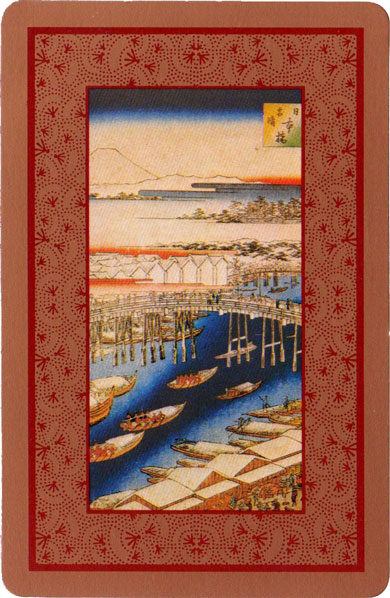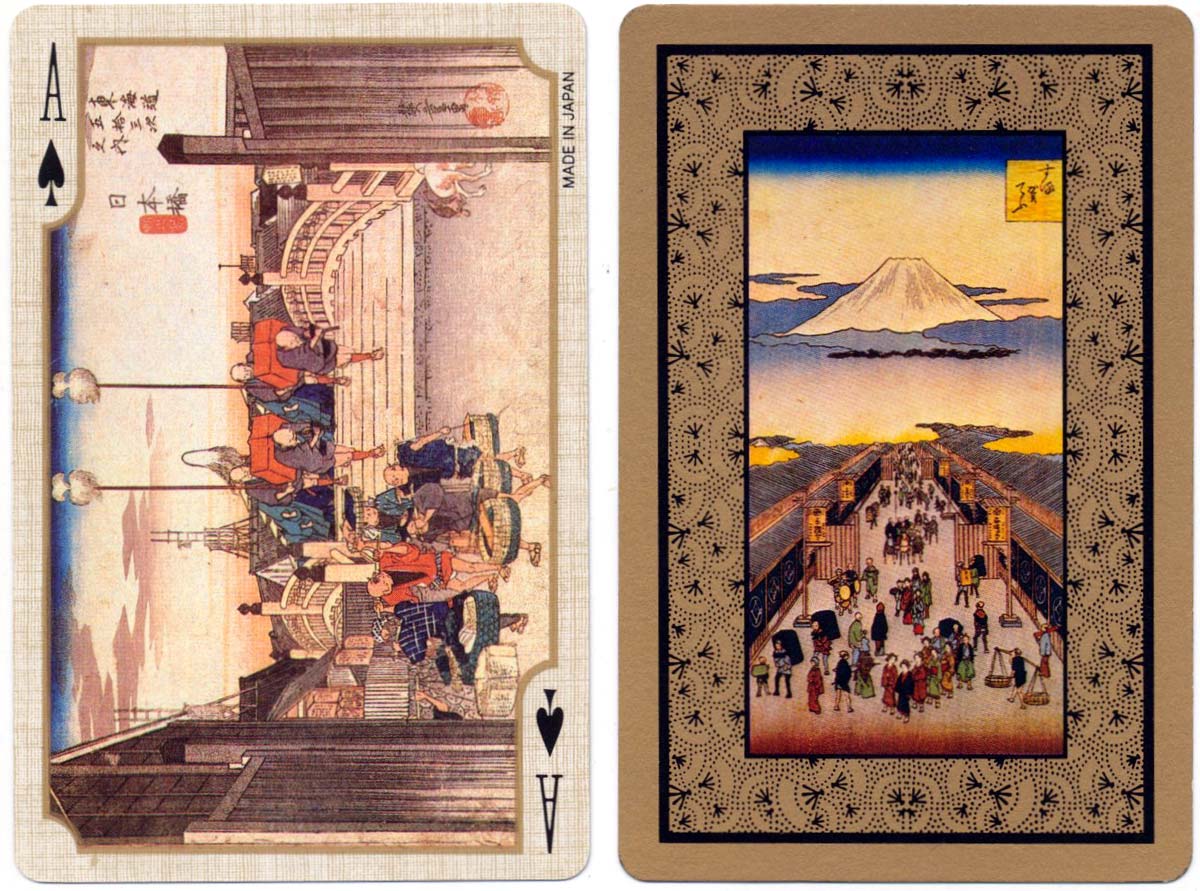Hiroshige Ukiyo-e playing cards
“Hiroshige” playing cards drawn by Hiroshige Ando (1797-1858) at 53 stopoffs on the journey from Edo (Tokyo) to Kyoto.
Fine artwork on playing cards is often constrained or wasted by the small size of each card, so here we have brought these wonderful paintings back to life. The textured surface of the cards adds to the visual enjoyment of these remarkable paintings, whilst the slender corner indices are not excessively intrusive.
Below: “Hiroshige” playing cards drawn by Hiroshige Ando (1797-1858) at 53 stopoffs on the journey from Edo (Tokyo) to Kyoto, manufactured in Japan by Angel Playing Cards Co.

Considered to be the last of the great Ukiyo-e masters, Hiroshige Ando (1797-1858) was most famous for his 53 stations of the Tokaido (East Sea Road). Hiroshige started to learn to draw at the age of 15 with Ukiyo-e artist Toyohiro Utagawa. He avoided beautiful women and concentrated on the Kabuki actors and Geishas for his human subjects but he mainly produced landscapes. The Tokaido was the main highway in Japan going from Edo (now called Tokyo) to Kyoto a distance of 450 km on the island of Honshu. In the 17th century the government set up 53 stations along the route with stables and somewhere to sleep for travellers to rest during their journey. It is still the busiest highway in Japan today.
Ukiyo-e (浮世絵; Japanese pronunciation: [u.ki.jo.e]) was a Japanese genre of painting and woodblock printing with subjects typical of the decadent lifestyle of the middle classes from the 17th century to the 19th century. Their entertainment was the Geishas and the Sumo wrestling and often Courtesans. The Ukiyo-e, which means “pictures of the floating world”, depicted these interests with pictures of the Geishas and Courtesans as beautiful women and the Kabuki actors and Sumo wrestlers as heroes. The natural world was also depicted by some of the artists.
See also: Wikipedia article Ukiyo-e →
• Website: Angel Playing Cards Co Ltd →

Above: an alternative back design. Courtesy Matt Probert.

By Simon Wintle
Member since February 01, 1996
I am the founder of The World of Playing Cards (est. 1996), a website dedicated to the history, artistry and cultural significance of playing cards and tarot. Over the years I have researched various areas of the subject, acquired and traded collections and contributed as a committee member of the IPCS and graphics editor of The Playing-Card journal. Having lived in Chile, England, Wales, and now Spain, these experiences have shaped my work and passion for playing cards. Amongst my achievements is producing a limited-edition replica of a 17th-century English pack using woodblocks and stencils—a labour of love. Today, the World of Playing Cards is a global collaborative project, with my son Adam serving as the technical driving force behind its development. His innovative efforts have helped shape the site into the thriving hub it is today. You are warmly invited to become a contributor and share your enthusiasm.
Related Articles

Zürcher Festspiel 1903
Swiss-suited pack designed by Robert Hardmeyer featuring figures from art and politics.

Never Mind the Belote
Limited edition Belote pack with designs by a collective of 24 street artists.

Playing card designs by Franz Exler
Reconstruction of playing cards from the original 1903 designs.

MITSCHKAtzen
Clever cat designs by the Austrian artist and illustrator Willi Mitschka.

22 Pittori in 22 Arcani
Collaborative Tarot with contributions from 22 different Italian artists including Menegazzi and Tav...

Whist by Ditha Moser
Ditha Moser created this minimalist Whist deck in 1905, in the style of the Vienna Secession art mov...

Keith Haring playing cards
Energetic graffiti images by the American artist Keith Haring.

Eki karuta
Japanese fortune-telling cards based on I Ching, with bold, modern designs.

Treasures from the Bodleian Library
Rare books, manuscripts, music scores, portraits, maps, gospels, chronicles and other valuable artef...

Carte di Natale
Designed by Pier Canosa as a Christmas pack for the Cortina Art Gallery in Milan.

Queen of Arts
A wide variety of women artists celebrated on cards with illustrations by Laura Callaghan.

Fredericks & Mae playing cards
A rainbow pack from the design team of Fredericks & Mae and Benjamin English.

Pam is the Knave of Clubs
Playing cards as metaphors in 18th century art - from fate, chance and social hierarchy t...

Leadmill playing cards
Promotional pack for an arts centre in Sheffield with designs by Martin F. Bedford.

Art pack I
Art pack featuring Old Masters, including Bruegel, Vermeer, Titian, Raphael, Caravaggio, Canaletto, ...

Typographic Playing Cards
Typographic Playing Cards designed by Jim Sutherland, c.2010.
Most Popular
Our top articles from the past 28 days
























































